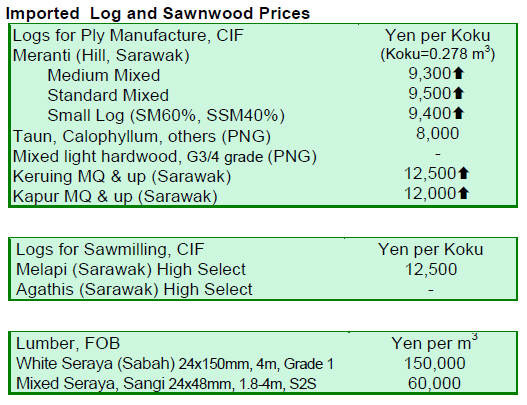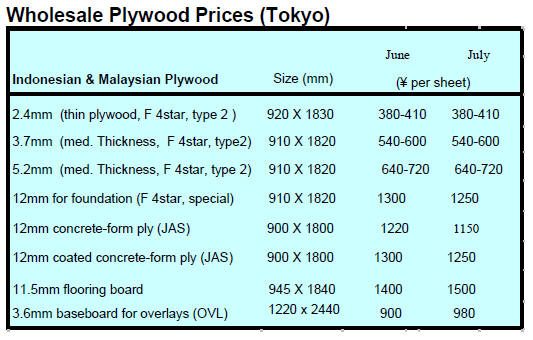Japan Wood Products
Prices
Dollar Exchange Rates of
13th July 2011
Japan Yen 79.01
Reports From Japan
Falling degree of timber self sufficiency
Japan’s timber self sufficiency had been increasing for the
past few years and the Japan Lumber Reports (JLR) says
the rate moved from 21% in 2005 to 28% in 2009.
However, in 2010 the level of imports rose reversing the
trend towards self sufficiency in wood products.
Data for 2010 indicates that the degree of self sufficiency
for sawnwood was 42%, down almost 2% on 2009 data.
For plywood domestic production was just 2.49 mil cu.m
while imports were 7.1 mil. cu.m. In 2010 plywood
consumption increased by 17% over that in 2009 but most
of the increase was accounted for by imports.
Restrictions of use of electricity
Due to the national power shortages brought about by
damage caused by the March earthquake and tsunami,
there are legislative restrictions in place on the use of
power.
Consumers using 500 KW or more in the area supplied by
the Tokyo and Tohoku electric power companies must
reduce consumption by 15%.
In the wood processing sector there are only a few
companies that are affected by the new legislation but
most have adopted voluntary power saving methods, part
of a national campaign to reduce power use so as to avoid
blackouts.
Record plywood imports from China exceed those
from Indonesia
According to the JLR, May plywood consumption was
622,800 cu.m., almost 30% more than in April. The
increase was brought about as end-users rushed to secure
stocks after the March disaster fearing a shortage of
plywood for restoration work.
Plywood imports for May were the highest since 2007 and
the majority came from N. America and China. In May
plywood imports from China exceeded those from
Indonesia for the first time.
The domestic supply of plywood in May is reported by the
JLR to have been 188,400 cu.m., down 12%.
Log prices in Sarawak ease
Export prices for logs from Malaysia are softening reports
the JLR. Log prices seemed to reach a peak in May and
then soften as demand eased slightly.
Export log prices in Malaysia were firm from mid 2009 on
the back of strong demand in China and India. When
orders from Japan started to increase after the disaster in
March domestic plywood mills in Malaysia struggled to
secure supplies.
Currently, the JLR is reporting that Sarawak Meranti
regular log prices are US$340-355 per cu.m FOB, lower
than in June this year. Meranti small log prices are at
US$310-320 per cu.m FOB. However, log inventories at
the ports are low so any further softening of prices is
unlikely.
Rising housing starts forecast to lift timber
consumption back to 2010 levels
Japan’s Forestry Agency (FA) recently drew up
projections of timber demand for the second and third
quarters of this year. In making the projections the factors
considered were housing starts and the continuing effects
of the March disaster.
It is projected that housing starts will increase from 2010
levels mainly as buyers rush to conclude purchases before
the eco-point system runs out.
Any decline in starts because regular building programmes
have been abandoned in the disaster hit areas will be
minimal says the JLR since the three worst hit areas
account for only around 3% of Japan’s annual housing
starts.
The FA expects demand for domestic logs to be the same
as last year while demand for imported logs and
sawnwood is expected to rise.
Demand for plywood logs is expected to increase,
especially in the third quarter as damaged plywood mills
resume production.
The stronger demand for plywood logs is expected to
extend through to the end of the third quarter so that
overall consumption in 2011 will be similar to that of
2010; however demand for tropical plywood logs will be
moderate as large volumes of imported plywood are
expected especially in the third quarter.
May housing starts
May housing starts were up around 6% to 63,726 units but
the increase was solely due to an increase in the number of
condominium units built. The number of private homes,
houses for rent and units built by builders for onward sale
have all declined.


Related News:
|